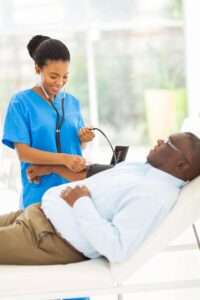Kofi Annan, the Secretary-General of the United Nations from 1997 through 2006, said “Knowledge is power. Information is liberating. Education is the premise of progress, in every society, in every family.”
Taking control of control of your health is a priority for most Americans. Jay Harold wants to provide useful information so you can make informed healthcare decisions. In this post, controlling high blood pressure is the focus.
High blood pressure is a serious illness. This is particularly the case for Black Americans since over forty percent of Black Americans have high blood pressure1 according to Centers for Disease Control and Prevention (CDC).
High blood pressure2 is often called a “silent killer” because many people have it but do not know it. Some people do not feel sick at first. Over time, individuals who do not get treated for high blood pressure can get very ill or even die.
High blood pressure can cause:
- kidney failure
- stroke
- blindness and
- heart attacks.
There is good news.
There are life-saving medicines people can take every day to help control their high blood pressure. Individuals who eat healthy foods, exercise, and take their medicines every day can control their blood pressure.
What is High Blood Pressure?
Blood is carried from the heart to all parts of the body in vessels called arteries. Blood pressure is the force of the blood pushing forward through the body and against the walls of the arteries. The higher the blood pressure, the higher the risk of stroke, heart attack, heart failure, kidney failure, and death.

Blood pressure is made up of two numbers:
- The “top” number is the systolic blood pressure—the pressure while the heart is pumping blood out. According to the National Institutes of Health (NIH)3, this number should be less than 120 to be in the normal range.
- The “bottom” number is the diastolic blood pressure—the pressure while the heart is filling up with blood, getting ready to pump again. According to NIH, this number should be less than 80 to be in the normal range.
It was once believed that only diastolic pressure (the “bottom” number) was important, but this is not true. Elevated systolic pressure alone, particularly common in older people, is just as dangerous as elevations of both systolic and diastolic pressure.
Blood pressure is elevated for two main reasons:
- too high blood volume
- too narrow blood vessels.
Most of the time, the cause of a person’s high blood pressure is unknown. Once it develops, high blood pressure usually lasts the rest of the person’s life. But it is treatable.
Some people can lower blood pressure by losing weight, limiting salt intake, and exercising, but for most people, these steps are not enough. Most people need medication for blood pressure control, and will probably need it all their lives.
Take your blood pressure medicines
It is essential to take your blood pressure medicines every day. Take your medicines even when your blood pressure comes down … even when you do not feel sick. Do not stop taking your medicine until your doctor says that it is OK.
Most people who take high blood pressure medicines do not get any side effects. Like all medicines, high blood pressure medicines can sometimes cause side effects. Some people have common problems like headaches, dizziness or an upset stomach. These issues are small compared to what could happen if you do not take your medicine.

45.7% of Black American Women have high blood pressure according to the CDC.
Treatment of High Blood Pressure with Calcium Channel Blockers4 (CCB’s)
If you are an African-American with high blood pressure, The American Medical Association’s Eighth Joint National Committee has put out its recommendations for the different types of medications that you can use as a guide to getting it under control. Please read the Jay Harold article on the New African-American High Blood Pressure Guidelines to learn more about recommended medications for Black Americans. Norvasc®is a Calcium Channel Blocker. Other Calcium Channel Blockers include diltiazem, verapamil, nifedipine, and nicardipine.
Calcium Channel Blockers lowers blood pressure by relaxing the blood vessels, so the heart does not have to pump as hard. Some Calcium Channel Blockers control chest pain by increasing the supply of blood to the heart.
Why is this medication prescribed?
Norvasc®(amlodipine) is used alone or in combination with other medications to treat high blood pressure and chest pain (angina). Amlodipine is in a class of medications called calcium channel blockers. It lowers blood pressure by relaxing the blood vessels, so the heart does not have to pump as hard. It controls chest pain by increasing the supply of blood to the heart. If taken regularly, amlodipine controls chest pain, but it does not stop chest pain once it starts. Your doctor may prescribe a different medication to take when you have chest pain.
High blood pressure is a common condition and when not treated, can cause damage to the brain, heart, blood vessels, kidneys and other parts of the body. Damage to these organs may cause heart disease, a heart attack, heart failure, stroke, kidney failure, loss of vision, and other problems. In addition to taking medication, making lifestyle changes will also help to control your blood pressure. These changes include eating a diet that is low in fat and salt, maintaining a healthy weight, exercising at least 30 minutes most days, not smoking, and using alcohol in moderation.
How should this medicine be used?
Amlodipine comes as a tablet to take by mouth. It is usually taken once a day. To help you remember to take amlodipine, take it around the same time every day. Follow the directions on your prescription label carefully, and ask your doctor or pharmacist to explain any part you do not understand. Take amlodipine exactly as directed. Do not take more or less of it or take it more often than prescribed by your doctor.
Your doctor will probably start you on a low dose of amlodipine and gradually increase your dose.
Amlodipine controls high blood pressure and chest pain (angina) but does not cure them. Continue to take amlodipine even if you feel well. Do not stop taking amlodipine without talking to your doctor.
Other uses for this medicine
This medication may be prescribed for other uses; ask your doctor or pharmacist for more information.
What special precautions should I follow?

Before taking amlodipine,
- Tell your doctor and pharmacist if you are allergic to amlodipine, any other medications, or any ingredients in amlodipine tablets. Ask your pharmacist for a list of the ingredients.
- Tell your doctor and pharmacist what prescription and nonprescription medications, vitamins, nutritional supplements, and herbal products you are taking or plan to take. Be sure to mention any of the following: certain medications for seizures such as carbamazepine (Carbatrol, Equetro, Tegretol), phenytoin (Dilantin, Phenytek), and phenobarbital; clarithromycin (Biaxin, in Prevpac); cyclosporine (Neoral, Sandimmune); efavirenz (Sustiva); indinavir (Crixivan); itraconazole (Onmel, Sporanox); ketoconazole (Nizoral); lovastatin (Altoprev, in Advicor); nefazodone;nelfinavir (Viracept); nevirapine (Viramune); rifabutin (Mycobutin); rifampin (Rifadin, Rimactane, in Rifamate), ritonavir (Norvir, in Kaletra), simvastatin (Zocor, in Simcor, in Vytorin), and tacrolimus (Astragraf SL, Prograf). Your doctor may need to change the doses of your medications or monitor you carefully for side effects.
- Tell your doctor if you have or have ever had heart failure or heart or liver disease.
- Tell your doctor if you are pregnant, plan to become pregnant, or are breast-feeding. If you become pregnant while taking amlodipine, call your doctor.
What special dietary instructions should I follow?
If your doctor prescribes a low-salt or low-sodium diet, follow these directions carefully.
What should I do if I forget a dose?
Take the missed dose as soon as you remember it. However, if it is almost time for the next dose, skip the missed dose and continue your regular dosing schedule. Do not take a double dose to make up for a missed one.
What side effects can this medication cause?
Amlodipine may cause side effects. Tell your doctor if any of these symptoms are severe or do not go away:
- swelling of the hands, feet, ankles, or lower legs
- a headache
- upset stomach
- stomach pain
- dizziness or lightheadedness
- drowsiness
- excessive tiredness
- flushing
Some side effects can be severe. If you experience any of these symptoms, call your doctor immediately or get emergency medical treatment:
- more frequent or more severe chest pain
- rapid, pounding, or irregular heartbeat
- fainting
If you experience a serious side effect, you or your doctor may send a report to the Food and Drug Administration’s (FDA) MedWatch Adverse Event Reporting program online (http://www.fda.gov/Safety/MedWatch) or by phone (1-800-332-1088).
What should I know about storage and disposal of this medication?

Keep this medication in the container it came in, tightly closed, and out of reach of children. Store it at room temperature and away from excess heat and moisture (not in the bathroom).
It is important to keep all medication out of sight and reach of children as many containers (such as weekly pill minders and those for eye drops, creams, patches, and inhalers) are not child-resistant and young children can open them easily. To protect young children from poisoning, always lock safety caps and immediately place the medication in a safe location – one that is up and away and out of their sight and reach.
Unneeded medications should be disposed of in special ways to ensure that pets, children, and other people cannot consume them. However, you should not flush this medication down the toilet. Instead, the best way to dispose of your medication is through a medicine take-back program. Talk to your pharmacist or contact your local garbage/recycling department to learn about take-back programs in your community. See the FDA’s Safe Disposal of Medicines website (http://goo.gl/c4Rm4p) for more information if you do not have access to a take-back program.
In case of emergency/overdose
In case of overdose, call your local poison control center at 1-800-222-1222. If the victim has collapsed or is not breathing, call local emergency services at 911.
Symptoms of overdose may include:
- dizziness
- fainting
- rapid heartbeat
What other information should I know?
Keep all appointments with your doctor. Your blood pressure should be checked regularly to determine your response to amlodipine. Do not let anyone else take your medication. Ask your pharmacist any questions you have about refilling your prescription. For more information about the risks and side effects of any drug, check Drugs@FDA.
It is important for you to keep a written list of all of the prescription and nonprescription (over-the-counter) medicines you are taking, as well as any products such as vitamins, minerals, or other dietary supplements. You should bring this list with you each time you visit a doctor or if you are admitted to a hospital. It is also important information to carry with you in case of emergencies.

Calcium channel blockers play a significant role in controlling many diseases that affect African-Americans. Calcium channel blockers are a preferred choice for hypertension according to the new JNC (Joint National Committee) 8 guidelines.
Jay Harold knows the potential problems with Calcium channel blockers (CCB’s) since he has taken them for years. Working with your doctor to find the best CCB’s for you is important to minimize side effects. You have a responsibility to yourself and your family to maintain good health. Do everything you can to achieve this goal.
Enjoyed this post? Share it and read more here. Jay Harold has put together a Resource page that you may find useful when trying to improve your health and wealth. Please take this advice from Muhammad Ali and give back to others. “Service to others is the rent you pay for your room here on earth.”




